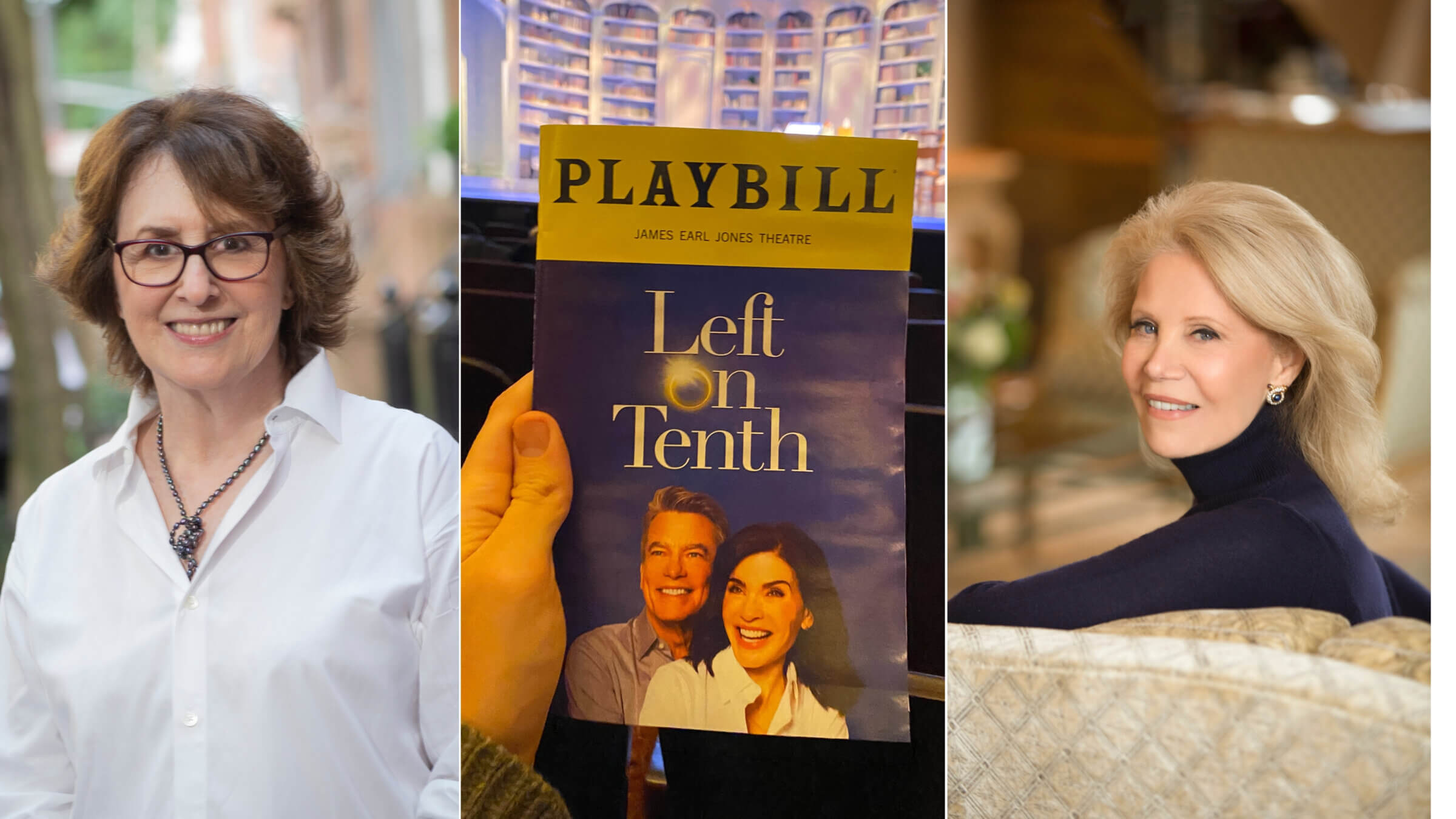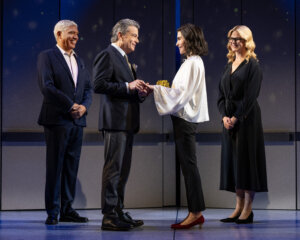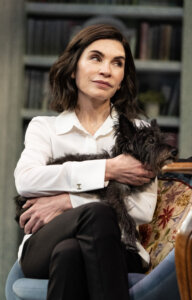How a special Yiddish word and a phone company inspired Delia Ephron’s new Broadway play
A bashert team, including Daryl Roth and Susan Stroman, helped bring Ephron’s memoir ‘Left on Tenth’ to Broadway

Writer Delia Ephron (left) and producer Daryl Roth (right) helped bring to life Left on Tenth , now playing on Broadway. Photo by Delia Ephron by Eleina Sebert, Daryl Roth by Jim Cox, center photo by Samuel Eli Shepherd
Before it was a Broadway show or even a published book, screenwriter Delia Ephron’s Left on Tenth began with a visit from an unusual muse: a phone call with Verizon.
After Ephron’s first husband Jerome Kass died in 2016, Ephron called Verizon to cancel his landline telephone. The company put her on hold for three hours and pinballed her between various service assistants. Ephron’s call prompted her to write a viral New York Times op-ed about her frustrations. The essay appeared again in Ephron’s 2022 memoir, where it sets in motion a story about Ephron falling in love again with a psychotherapist named Peter Rutter, only for her to be soon thereafter diagnosed with leukemia.
“Peter wrote to me after he read about my catastrophes with Verizon and that I was now widowed, and because we had a couple dates a hundred years ago,” Ephron explained to me over Zoom. “And he just said bashert, like he was looking for me his whole life.”
Now, director Susan Stroman has adapted Ephron’s story of finding her bashert amidst grief and cancer into a new Broadway play. At the James Earl Jones Theatre, Verizon hold music plays on a loop as the audience takes their seats. Then, Julianna Marguiles (The Good Wife) arrives on stage as Delia, later accompanied by Peter Gallagher (The OC) as Peter, for a 100-minute romance that is as warm and as culturally Jewish as a bowl of matzo ball soup from the Second Avenue Deli.

In Left on Tenth, the term “Bashert,” the Yiddish term for destiny, plays a pivotal role. Peter mentions it in his initial email to Delia, and he later returns to the word in his wedding vows when Delia is sick. Daryl Roth, the show’s producer and longtime collaborator of Ephron and her sister, even organized shirts and merchandise pins for sale with the term “Bashert” on it.
“Everybody’s in love with the word. It became this wonderful way we felt about the whole play actually,” Ephron said. “I mean, it’s Yiddish. Yiddish words are rich!”
“Bashert also means ‘meant to be,’” Roth added, speaking from her award-dazzled office over Zoom. “I think when Delia spoke to me about her manuscript, I think she came to me kind of knowing that I would be the one meant to produce this.”
Ephron grew up in Beverly Hills to two Jewish screenwriter parents, before she moved to New York City for college. (The title Left on Tenth refers to Ephron’s directions home to her Greenwich Village apartment.) Her sister, Nora Ephron, who passed away in 2012, was a renowned screenwriter known for penning romantic comedies like When Harry Met Sally and Sleepless in Seattle. Her other two sisters, Amy and Hallie, are also accomplished novelists. The Ephrons grew up in a culturally Jewish home, but their parents were more committed to left-wing politics than religion.
“My mother was actually against organized religion, ‘Religion is the cause of all wars,’ she would say,” Ephron recalled. “And yet, you know, there was no question that we were Jewish. We ate lox and bagels every Sunday. We worship books, which we considered part of the culture.”

That type of more cultural, broad-strokes American Judaism comes to life on stage in Left on Tenth, which features many of the elements of comfort that Ephron considers central to her Jewish identity. Two pets are included in the cast, who play Delia’s Havanese dogs Honey and Charlie. The set recreates the expansive bookshelves in Ephron’s Greenwich Village apartment, including a sign from the bookstore “The Shop Around the Corner” in You’ve Got Mail, which Ephron wrote.
“I think there’s a warmth to being Jewish,” Ephron said. “And a sense of family. Not just your own family, but a family within the Jewish community.”
Throughout the play, Delia finds warmth in her friends: a rolodex of neighbors, writers and doctors played by actors Peter Francis James and Kate MacCluggage. They provide everything from dating app tips to boxes of doughnuts; in a poignant scene, Delia’s neighbor Mitch shares advice from his experience living with HIV to encourage her to take an experimental medication.
“I had friends on that trip that just buoyed me,” Ephron said. “That’s something available to everyone in life: friendship,” she said.
“To me, being Jewish is being a caregiver,” Roth added. “One of the main parts for me of this story that resonates so deeply is how Peter takes care of Delia,” Roth said. “To me, that’s very Jewish.”
Another quintessentially Jewish theme in Left on Tenth? “Resilience,” Roth said. In the show, Delia endures waves of grief as she copes with the loss of her first husband, but she still musters up the courage to open herself up to love again. She also exhibits a sharp sense of humor and a determined optimism as she undergoes experimental chemotherapies.
Roth mentioned that resilience plays a major role in Jewish religious tradition and history, both biblical and recent. “Look at what just happened on October 7th,” Roth said. “I don’t want to be political here, but I’ll tell you that is a resilient people.”
Ephron and Roth hope that audiences – young, old, Jewish or otherwise — will exit the theatre feeling reinvigorated, and that they realize that like Delia onstage, it is never too late to take risks.
“I’m going to be open to love, I’m going to be open to a new adventure, I’m going to be open to something that I really was afraid of,” Roth said when discussing the lessons she hopes people take away from the show. “And I think another lesson of the play is that you can get through it. This too shall pass.”
And by the way, I asked. Ephron now uses Spectrum for her home landline. Verizon was emphatically not her bashert.

















